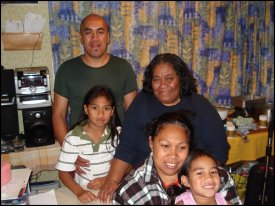
Māori loyalty
The Māori people have a lot of good stuff to say about loyalty. Prism editor Ben Hoyt talks about some of the issues with a neighbour, Roberta Arahanga, and some of her extended family (whanau).
BH: What’s the Māori word for loyalty? Is loyalty high on the list of things important to you?
RA: The Māori word is pono, or piripono, and it is very important; we expect it from all of our family. In terms of supporting what is right, the heart (aroha) is also very important.
What are some of the things loyalty means to Māori?
Loyalty also has a lot to do with respect, though that’s going downhill because now we’re being urbanised, and there’s not such a sense of community. And giving support, especially in someone’s hour of need, say at a funeral (tangi) – giving encouragement in rough times. Sharing our talents with each other, and not just being selfish about them.
Gossiping about friends is another thing. If my friend is being talked about in a bad way, I am not going to let it happen. Gossip – that’s not loyalty.
Which is more important, loyalty to immediate family or loyalty to whanau?
I don’t differentiate between the two. (Though as a grandparent, of course there’s a special closeness with my grandchildren.) We would always remain loyal to whanau, though we won’t condone it when they do what’s wrong.
As an example, if a family member invited me to speak at her little embroiderer’s guild or something, but then I’m invited to a flash Hollywood dinner, all expenses paid, on the same night – we’d definitely have to say no to the dinner. That’s just loyalty.
You mentioned a tangi, or funeral, and I understand you’ve recently had a death in the family. If you don’t mind talking about it, how does family loyalty work at a tangi?
It was a neighbour and a brother-in-law. He’s been there for us, and now we can be there for him – there’s no question about loyalty.
A family is like a tree, where the trunk is your ancestors, and there are many branches, and you are one of them. If one of the branches dies, there is support from all the branches around. The family with the death doesn’t do anything at the tangi – everything is organised and supported by the other branches.
As Christians, we believe our bodies will be resurrected. Do you believe in an afterlife? What are some other spiritual beliefs that help you at times like this?
Yes, Māori believe in an afterlife, that we will go to a better place, that they’re up there waiting for you. That’s something that gives us hope.
Love is a spiritual thing, too. Even dna! If someone dies, we sometimes see these personalities come alive again in the younger children, in the grandkids.
What are your views on loyalty and land?
How much time have you got, Ben – have you got all year? [laughs] Well, I can only speak for myself. I am very possessive of all that is Māori. Our language (te reo) is very much connected with land.
If I had to buy a bone carving, I would buy one that was New Zealand made, Māori made, not mass produced in China. That’s part of loyalty to our people.
It’s also about history. For example, people chop down so much native bush and plant pine trees in their place. Pine trees only take 25 years to grow, but a totara tree – that takes 100 years. It takes time, it’s history, going and going.
And one last question: what’s important to you as far as work and jobs are concerned?
Well, I’m from a family of workers. My mother and father, they worked. I worked. My husband (my tane, my “man”), when he was still alive, he worked. And he was a role model for the children. That’s very important, that they see the older people as role models, and they want to earn a good honest wage too.
I don’t want my children and grandkids to do what I want them to do, I want them doing what they want to do, what they love. I’ve seen people who are very happy doing the rubbish for the council. But if they are happy being a doctor, that’s great too. I believe people can be happy whatever they do.

